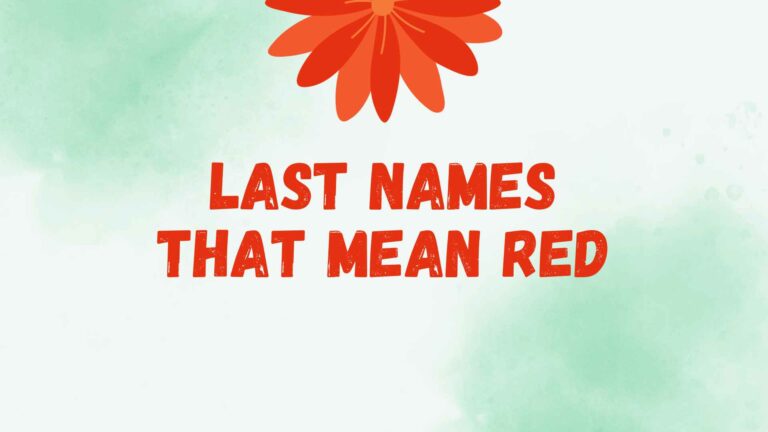100 Cool Italian Last Names
Italian last names have historical and cultural significance; they demonstrate centuries of tradition, regional influences, and some even represent a profession or family heritage.
From the noble surnames of medieval Italy to those named after geographical landmarks or personal traits, every name tells its own unique story.
Whether you are trying to find your ancestry, understand the meaning of popular Italian surnames, or appreciate Italian culture, the appreciation of these names opens a new window to Italy’s past.
In this blog post, we will explore the roots, meanings, and significance of the Italian last names; so, let’s begin!
Italian last names
Rossi – “Red,” often referring to someone with red hair.
Russo – “Red-haired” or “red-skinned,” common in Southern Italy.
Ferrari – Derived from “ferraro,” meaning “blacksmith.”
Bianchi – “White,” possibly referring to someone with fair hair or complexion.
Romano – “From Rome” or “Roman.”
Colombo – “Dove,” symbolizing peace.
Conti – “Counts” or nobility, often associated with aristocratic families.
Esposito – “Exposed” or “abandoned,” historically given to foundlings.
Ricci – “Curly-haired.”
De Luca – “Son of Luca.”
Moretti – “Dark-skinned” or “Moorish.”
Gallo – “Rooster,” possibly signifying vigilance or strength.
Mancini – “Left-handed.”
Caruso – “Boy” or “young apprentice.”
Rizzo – “Curly-haired,” similar to Ricci.
Lombardi – “From Lombardy,” a northern region of Italy.
Barbieri – “Barber.”
Pellegrini – “Pilgrim” or “traveler.”
Longo – “Tall” or “long.”
Greco – “Greek,” indicating Greek ancestry.
Benedetti – “Blessed.”
Mariani – “Descendant of Mario.”
De Santis – “Of the saints.”
Fiore – “Flower.”
Gentile – “Kind” or “noble.”
Sorrentino – “From Sorrento,” a coastal town in southern Italy.
Marchetti – “From the Marche region.”
Valentini – “Strong” or “healthy,” from the Latin “valens.”
Martino – “Of Mars,” the Roman god of war.
Caputo – “Large-headed” or “chief.”
Orlando – “Famous land” or “heroic.”
Parisi – “From Paris,” or possibly of French descent.
De Angelis – “Of the angels.”
Fabbri – “Smith” or “metalworker.”
Ferraro – Another variation meaning “blacksmith.”
D’Agostino – “Son of Agostino (Augustus).”
Monti – “Mountains.”
Piras – “Pear tree,” common in Sardinia.
De Laurentiis – “Descendant of Laurentius” (meaning “from Laurentum”).
Pugliese – “From Puglia,” a region in southern Italy.
Alfieri – “Standard-bearer” or “flag-bearer.”
Sartori – “Tailor.”
Vivaldi – “Lively” or “full of life.”
Basile – “Royal” or “kingly,” from the Greek “Basileus.”
Bellini – “Little beautiful one.”
D’Amico – “Friend” or “from a friend’s lineage.”
Cattaneo – “Captain” or “leader.”
Lazzari – “From Lazarus,” meaning “God has helped.”
Fontana – “Fountain” or “spring,” possibly indicating a location near water.
Serafini – “Seraphim” or “angelic beings.”
Amato – “Beloved” or “dear.”
Baldi – “Bold” or “courageous.”
Barone – “Baron,” indicating noble ancestry.
Bernardi – “Son of Bernardo,” meaning “strong as a bear.”
Boccia – “Round” or “plump,” possibly referring to a physical trait.
Bruno – “Brown,” referring to hair or complexion.
Cappello – “Hat” or “cap,” possibly linked to a hatmaker.
Casella – “Little house” or “cottage.”
Castelli – “Castles,” possibly indicating noble origins.
Cavalli – “Horses,” likely linked to horse traders or breeders.
Celeste – “Heavenly” or “blue.”
Cervi – “Deer,” possibly signifying agility or grace.
Coppola – “Cap,” possibly linked to the famous Sicilian hat.
Costantini – “Descendant of Costantino,” meaning “constant” or “steadfast.”
D’Amore – “Of love,” symbolizing affection or devotion.
D’Angelo – “Son of Angelo,” meaning “angelic.”
De Rosa – “Of the rose,” possibly linked to beauty or nobility.
De Simone – “Son of Simone,” meaning “God has heard.”
Di Benedetto – “Of Benedetto,” meaning “blessed.”
Di Francesco – “Of Francesco,” meaning “free man.”
Di Marco – “Of Marco,” meaning “warlike.”
Di Pietro – “Of Pietro,” meaning “rock” or “stone.”
Donati – “Given” or “gifted,” possibly referring to an adopted child.
Ferri – “Iron,” similar to Ferrari and Ferraro.
Fiorentino – “From Florence.”
Galante – “Gallant” or “chivalrous.”
Garibaldi – “Brave spear,” famously linked to the Italian revolutionary leader.
Grassi – “Fat” or “plump,” possibly a nickname.
Guerrini – “Little warrior” or “fighter.”
Iannelli – “Little John,” a diminutive of Giovanni.
Landi – “From the land” or “rural.”
Lazzaro – “God has helped,” linked to the biblical Lazarus.
Lorenzi – “Son of Lorenzo,” meaning “crowned with laurel.”
Maggi – “May” or “Magus,” referring to the wise men.
Mazza – “Mace” or “club,” possibly linked to a warrior.
Messina – “From Messina,” a city in Sicily.
Montanari – “Mountain dwellers.”
Napolitano – “From Naples.”
Neri – “Black,” referring to dark hair or complexion.
Orsini – “Little bear,” linked to a powerful noble family.
Pagano – “Pagan” or “rustic,” once used to distinguish non-Christians.
Palumbo – “Pigeon” or “dove.”
Pastore – “Shepherd.”
Rinaldi – “Son of Rinaldo,” meaning “wise power.”
Rossetti – “Little red one,” referring to red hair or a rosy complexion.
Salerno – “From Salerno,” a city in southern Italy.
Santoro – “Of the saints,” linked to religious devotion.
Siciliano – “From Sicily.”
Toscano – “From Tuscany.”
Veneziano – “From Venice.”







